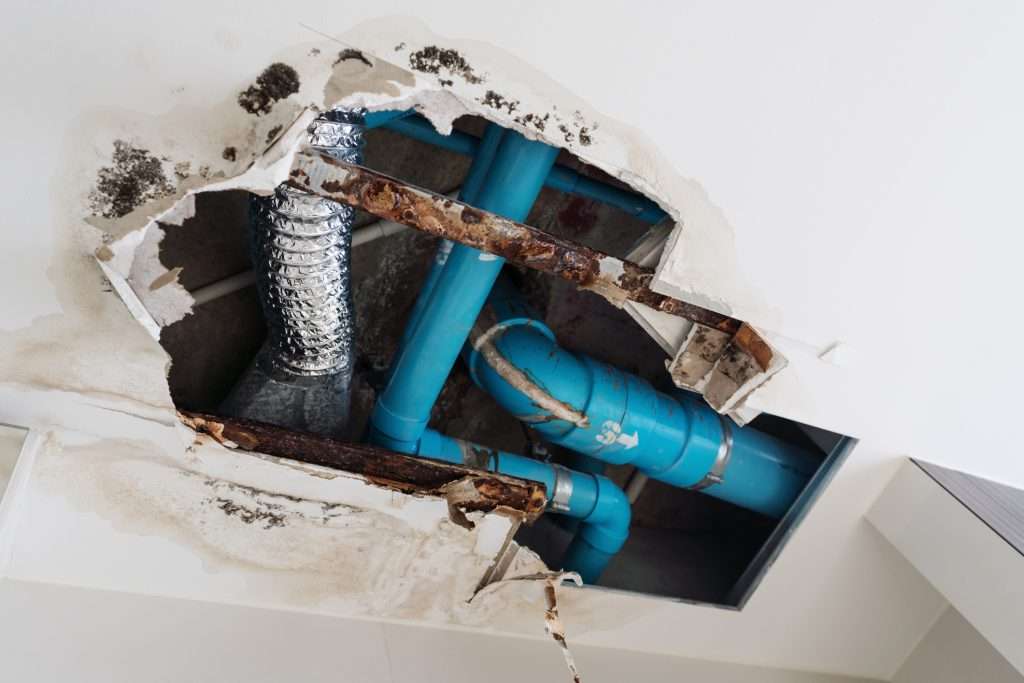Household leaks may seem small at first, but they can lead to big problems, from wasted water to costly water damage. Knowing how to find a water leak in the house is the first step to preventing headaches down the road. In this guide, we’ll cover the most common leaks, sneaky signs of trouble, and how the pros at Great Basin Plumbing use advanced leak detection to protect your home.
What Is a Leak?
A household leak occurs when water escapes from your plumbing system, whether from a toilet tank, a leaky faucet, a cracked pipe, or even an in-ground irrigation system. Some leaks are obvious, while others hide behind walls, under sinks, or below ground.
According to the Environmental Protection Agency, household leaks can waste nearly a trillion gallons of water annually in the U.S. alone. Fixing even small problems like dripping faucets and toilet leaks can help save water and lower your water bills.
Immediate Signs of a Leak
Some leaks are easy to spot. Look for:
- Wet spots on walls, ceilings, or floors
- Constant sound of running water when no faucets are on
- Low water pressure
- Pooling water near fixtures or appliances
- Mold or mildew smells
- Spikes in your monthly water bill
These are all signs you should call a plumber to inspect right away to get to the root of the issue quickly.
Sneaky Signs of a Hidden Leak
Some leaks don’t show obvious symptoms until damage is done. Here are a few lesser-known indicators:
- Discoloration or bubbling paint on a wall or ceiling
- Loose or warped flooring near your sink, toilet, or tub
- Water meter running when all water is off
- Dead or soggy patches near your irrigation system or water main
- A wobbly or constantly running toilet (check the toilet flapper)
To catch sneaky leaks, turn off all fixtures and appliances, then watch your meter. If the dial moves, you may have a hidden leak and be in need of leak detection services.
What to Do If You Spot a Leak
If you suspect a leak, act quickly:
- Turn off the water supply at the closest valve or main line.
- Use a towel, bucket, or drain to minimize water damage.
- Avoid using fixtures near the suspected source.
- For toilets, try placing food coloring in the tank. If it leaks into the bowl without flushing, you’ve got a problem.
- Call a licensed plumber to inspect, locate, and fix leaks before they escalate.
When to Call a Professional for Leak Detection
While you might be able to replace a washer, tighten faucet handles, or install a new faucet yourself, some problems require professional help, especially if the leak is in the water line, walls, or foundation.
Call a pro if:
- You can’t pinpoint the source
- You suspect a pipe or drain issue
- You’re dealing with recurring toilet leaks
- There’s a leak near your irrigation system
- You notice water where it shouldn’t be, like behind appliances or under the ground
How Great Basin Plumbing Finds Leaks You Can’t
At Great Basin Plumbing, we use advanced tools to find leaks that aren’t visible to the eye. From infrared cameras to pressure testing and acoustic sensors, we can detect moisture inside walls, under slabs, and in your irrigation system without damaging your home.
We don’t just detect leaks. We offer fast, effective solutions to fix them. Whether it’s replacing a faulty toilet flapper, resealing a faucet, or repairing an underground water line, we’ve got you covered
Save Water. Stop Damage. Fix Leaks Fast.
Don’t let a small leak lead to big trouble. No matter the issue, Great Basin Plumbing is your go-to expert for accurate leak detection and fast repairs.
Take action to protect your home and save water. Contact Great Basin Plumbing today and let our professionals help you locate and fix every leak before it costs you.

